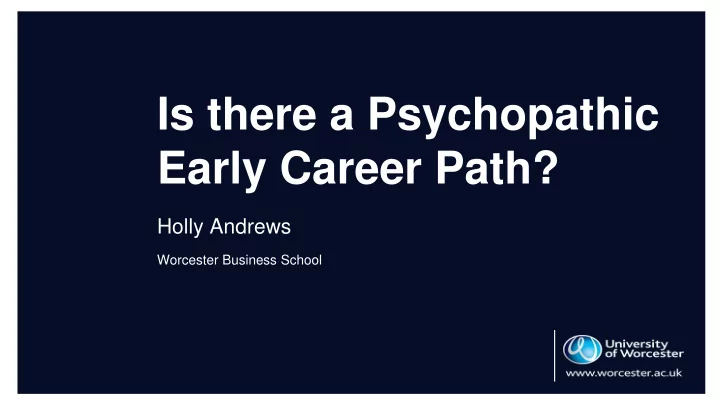

Is there a Psychopathic Early Career Path? Holly Andrews Worcester Business School
Contents The research gap Methodology Results Implications Limitations
The Early Career Steps of Psychopaths Psychopathy related to career interests (Henley, 2001; Jonason at al., 2014) Psychopathy related to educational choices (Clow & Scott, 2007; Wilson & McCarthy, 2011)
Research Gaps Inconsistent results Use of total psychopathy scores No UK research
Methodology Internet-mediated self-report questionnaire 913 undergraduate students Measure of psychopathy – 3 factor revision of the Levenson Self-Report Psychopathy Scale (Brinkley et al., 2008) UNIACT-S (ACT, 2009) measure of career interests (based on RIASEC model) Degree subject
Results – Career Interests Interest Scale Psychopathy Factor Predicted Relationship Relationship Found Realistic Egotism Positive None Callousness Antisocialism Social Egotism Negative Negative Callousness Negative Antisocialism None Investigative Egotism None Positive Callousness None Antisocialism None Artistic Egotism None Negative Callousness None Antisocialism Positive Enterprising Egotism Positive Positive Callousness None Antisocialism None Conventional Egotism Positive Positive Callousness None Antisocialism Negative
Results – Career Interests
Results – Educational Choices Exp(β) GOT Sig. Predictor Variable B S.E Wald Realistic Gender (=male) 3.409 .757 20.286 30.241 Social Social desirability* 1.073 .560 3.673 2.925 Enterprising Age -.074 .037 4.093 .929 Egotism 1.548 .370 17.463 4.702 Conventional Egotism 2.747 .789 12.116 15.599 *marginally significant at 0.1 level Artistic courses comparison group
Implications Enterprising careers of interest to psychopathic undergraduates. Social careers opposite – not attractive to psychopaths. Conventional careers (particularly finance) of interest to a younger generation of high Egotism but not necessarily high Antisocialism individuals Enterprising and Conventional degree courses being studied by higher psychopathy individuals. Prestige could explain results. Interests don’t always translate into choices – difficulty? Factors of psychopathy crucial – Egotism and Antisocialism work in opposing ways Egotism is the most important psychopathic predictor when choice is determined by the individual (interests and educational choice)
Limitations Cross-sectional design Sample Measures Limitations of self-report psychopathy LSRP UNIACT Non-normally distributed data
Questions?
References ACT (2009). ACT Interest Inventory Technical Manual . Iowa: ACT Inc. Brinkley, C.A.,Diamond, P. M., Magaletta, P.R., & Heigel, C. P. (2008). Cross-validation of Levenson’s Psychopathy Scale in a sample of federal female inmates. Assessment, 15 (4), 464-482. Clow, K. A., & Scott, H. S. (2007). Psychopathic traits in nursing and criminal justice majors: A pilot study. Psychological Reports, 100 , 495-498. Henley, A.G. (2001). Psychopathy and Career Interest in a Noncriminal Population (Unpublished Doctoral Dissertation). University of Texas, Austin. Jonason, P. K., Wee, S., Li, N.P., & Jackson, C. (2014). Occupational niches and the dark triad traits. Personality and Individual Differences, 69 , 119-123. Wilson, M., & McCarthy, K. (2011). Greed is good? Student disciplinary choice and self- reported psychopathy. Personality and Individual Differences, 51 , 873–876.
Recommend
More recommend